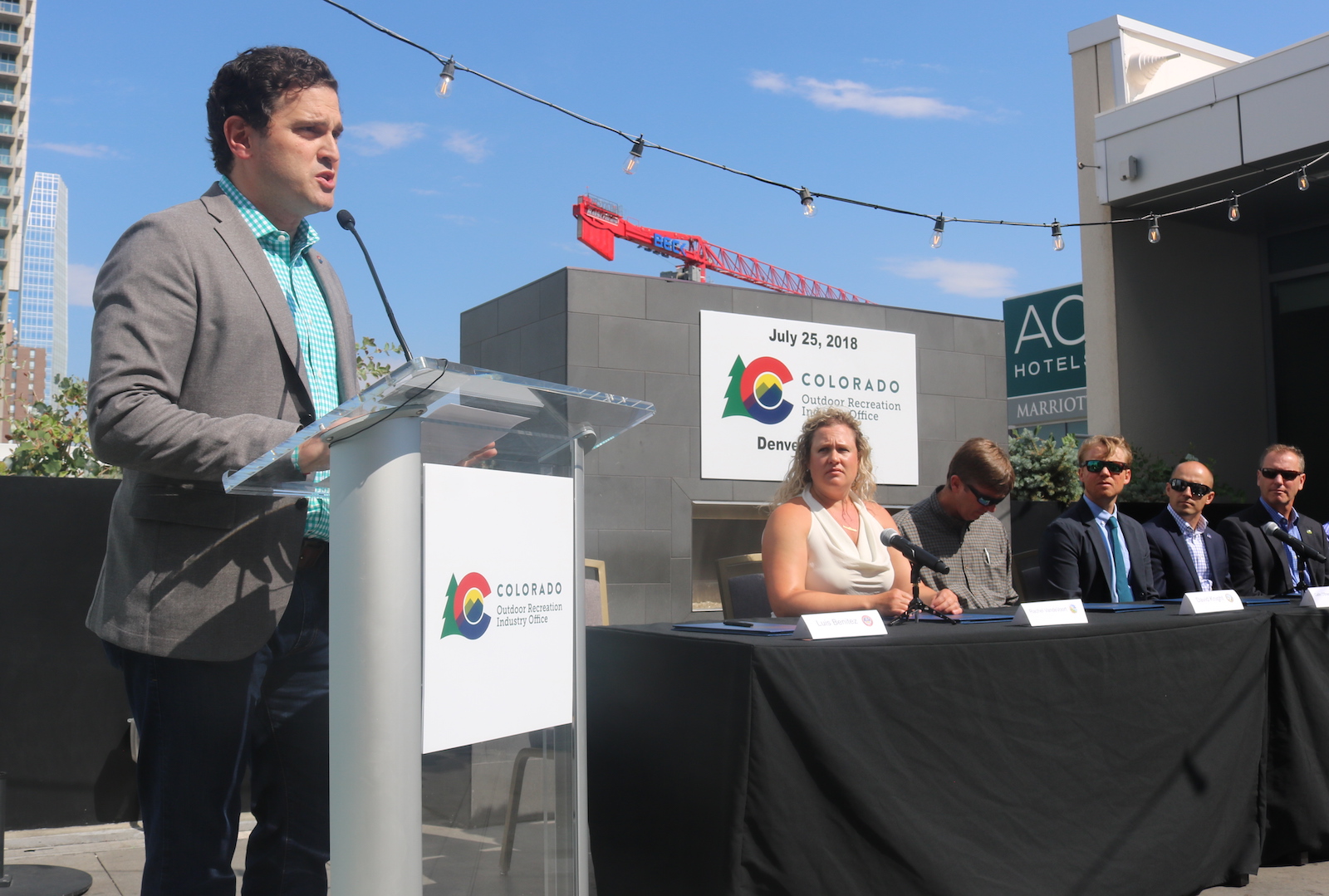The Local newsletter is your free, daily guide to life in Colorado. For locals, by locals.
The $887 billion outdoor industry grew in strength Wednesday morning as eight states, led by Colorado, signed the Confluence Accords, a wide-ranging, first-of-its-kind document that provides a set of common values and best practices for states with economies that depend on outdoor recreation. Representatives from Montana, Utah, Oregon, Vermont, Washington, North Carolina, and Wyoming joined Luis Benitez, director of Colorado’s Outdoor Recreation Office, to sign and officially ratify the Accords at Le Méridien hotel in Denver.
The months-long bipartisan effort to create an alliance between these eight “original states”—the only states so far in the United States that have offices dedicated to outdoor recreation—was spearheaded by Benitez and Colorado Governor John Hickenlooper. “I saw a really clear need to get the gang together in an official way,” Benitez says of his colleagues in the other states. “And Governor Hickenlooper—because the Outdoor Retailer show is now here—he really wanted us to lead it.”

The process began last November when Benitez sent a survey to other state representatives about what practices work best in their respective economies. Then in January, at the first Outdoor Retailer expo hosted by Denver, the representatives had a summit and began drafting the Confluence Accords. After seven months, the representatives met again two weeks ago for a second summit in North Carolina, where they agreed on the language and pillars of the document and left with a common goal: Convince your Governor to support it. While Benitez did not say which states took longest, he said it was down to the wire. Ultimately, all eight states’ Governors supported the Accords and on Wednesday morning the document was ratified just a block from the Colorado Convention Center where the Outdoor Retailer Summer Market is in full swing.
The Confluence Accords rests on four pillars: economic development, conservation and stewardship, education and workforce training, and public health and wellness. “The goal is as much cooperation, partnership, and transparency as we can muster,” Benitez says. The alliance provides a way for the states to share knowledge and best practices within the industry but, perhaps most importantly, it defines rules for engagement when courting outdoor industry businesses.
Because outdoor recreation is such a lucrative industry—generating $28 billion in yearly consumer spending and 229,000 jobs in Colorado alone—it’s a given that each state would want to act in their own best interest. That dynamic creates economic competition, even (and perhaps especially) among the eight states that signed the Accords, Benitez admits. “At the end of the day, we are responsible to our governors and to keep our economies strong and growing,” he says. “Companies move around sometimes. And they look at one state compared to another state. We try to be as transparent as we can, given the fact that when companies are looking at moving, they are very private about those things.”
Part of the Accords is aimed to address economic competition head on. “There are ways to do economic development and there are ways not to do it. There are states out there that will cold call some of your iconic companies, and try to swipe them right out from underneath you,” Benitez says. “That’s not what the way we’re going to work together.” Instead, the eight signatory states agreed not to court companies based elsewhere unless they are approached first by that company. “If companies approach us, that’s one thing. That’s respectful. That’s a professional agreement between states,” he says.
Beyond economic development and business ethics, sharing of knowledge is one of the key motivators that compelled each state to participate in the process. “In public policy, I never saw a good idea that I didn’t want to steal,” Jon Snyder, policy advisor for outdoor recreation in Washington, joked at a press conference Wednesday morning. “I hope that other states will steal this from us.” If things go to plan, at least five other states will be doing just that shortly. According to Benitez, Michigan, Maryland, Kansas, Arkansas, and Pennsylvania are working to join the Accords at the next summit in January 2019.
Political tides could change before more states hop on board, though, as midterms elections in November shift leadership at the executive and legislative level across the country. When we spoke in May, Benitez noted that, depending on who is elected the next Governor of Colorado, the Outdoor Recreation Office could be fundamentally changed or eliminated. Still, he is confident that the work being done in Colorado will speak for itself and, furthermore, he says the spirit of the Accords was constructed in such a way that he expects bipartisan support to continue far beyond November’s election.








